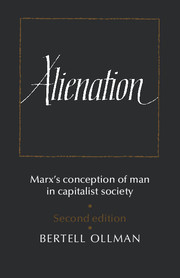Book contents
- Frontmatter
- Contents
- Preface to the second edition
- Note on translations
- Acknowledgements
- General introduction
- PART I PHILOSOPHICAL INTRODUCTION
- PART II MARX'S CONCEPTION OF HUMAN NATURE
- PART III THE THEORY OF ALIENATION
- PART IV CONCLUSION
- Appendix I In defense of the philosophy of internal relations
- Appendix II Response to my critics: more on internal relations
- Notes to the text
- Bibliography of works cited
- Index of names and ideas
- Cambridge Studies in the History and Theory of Politics
Appendix II - Response to my critics: more on internal relations
Published online by Cambridge University Press: 05 June 2012
- Frontmatter
- Contents
- Preface to the second edition
- Note on translations
- Acknowledgements
- General introduction
- PART I PHILOSOPHICAL INTRODUCTION
- PART II MARX'S CONCEPTION OF HUMAN NATURE
- PART III THE THEORY OF ALIENATION
- PART IV CONCLUSION
- Appendix I In defense of the philosophy of internal relations
- Appendix II Response to my critics: more on internal relations
- Notes to the text
- Bibliography of works cited
- Index of names and ideas
- Cambridge Studies in the History and Theory of Politics
Summary
Most of the criticisms of the first edition of Alienation have centered on my account of Marx's philosophy of internal relations. I would like to take advantage of the appearance of this second edition to develop my defense of this philosophy beyond the brief remarks found in Appendix I.
In ascribing a philosophy of internal relations to Marx, I intended to call attention to the assumption of identity which underlies his analysis of the different processes and institutions of capitalist society. As Relations, these processes are conceived of as aspects of each other and of the whole they come together to compose. Their mutual dependence or reciprocal interaction can be viewed within each Relation in turn, the chief difference being one of focus and perspective on the whole. After examining some of the problems of language posed by this approach, I used it to help explain Marx's conception of human nature and his theory of alienation.
According to many critics, this assumption of identity makes it impossible to register, let alone account for, real differences. If Marx had a philosophy of internal relations, it is asked, how could he distinguish between processes which are closely related, those which are loosely related and those which – for all practical purposes – are unrelated? How can he say that something has different relations at different times, if with the change of relations the thing itself changes?
- Type
- Chapter
- Information
- AlienationMarx's Conception of Man in a Capitalist Society, pp. 263 - 276Publisher: Cambridge University PressPrint publication year: 1977

